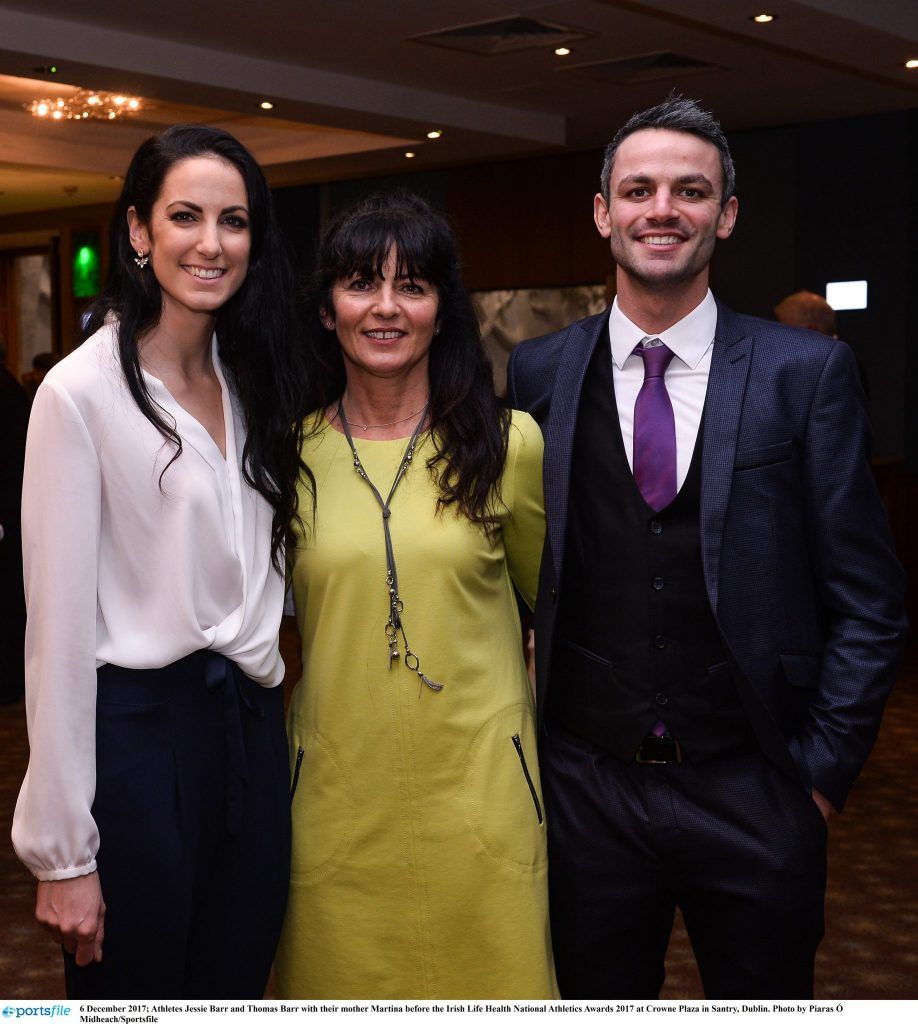

Share
21st August 2019
11:38am BST

 She's gone out of her way to distinguish herself as a staff member for Team Ireland, trying to avoid some of the lunch tables she would have frequently socialised at as an athlete, but while she wants to create some distance between Jessie Barr the athlete and Jessie Barr the burgeoning sports psychologist, she admits that her career on the track immediately allows athletes to relate to her as a professional.
She's gone out of her way to distinguish herself as a staff member for Team Ireland, trying to avoid some of the lunch tables she would have frequently socialised at as an athlete, but while she wants to create some distance between Jessie Barr the athlete and Jessie Barr the burgeoning sports psychologist, she admits that her career on the track immediately allows athletes to relate to her as a professional.
"Now when I'm working, because athletes know that I've been there, I straight away have an in," said Barr. "Athletes want to know that what they're talking about, you get it. I may not have had that exact experience but high performance sport is high performance sport. Whether you're jumping hurdles or getting punched in the face. There's the same kind of stresses, the same kind of nerves, who's watching, what people are thinking, what this performance means if it does or doesn't go well. "It's the same pressures across anywhere where you are trying to perform. I think having been an athlete, having been one so recently, and of an age profile where I'm not that much older, sometimes they're older than me, but sometimes I'd feel that they were happy to talk to me because I was someone that had been there before."Barr's career as a hurdler gives her a level of immediate credibility with those that athletes that she now works with, and while she admits to being very self-focused during her own career, she finds now that a lot of athletes share similar anxieties before competition.
"Nerves are something a lot of younger athletes come to me with," she adds. "I suppose they might not have the strategies to deal with it. One of the first things I do with an athlete who gets nervous is I say to them it's normal to get nervous. It's usually about where the nerves are coming from and what are they stemming from? "Nerves are just a reaction in your body. You feel the same on a rollercoaster when you get near the top. Physically it's the exact same. It's excitement. On raceday suddenly nerves are bad. "I usually explore why is it that nerves are giving people that bad feeling. It's funny cause a lot of it is picturing the 'what ifs'. https://twitter.com/JessieBarr247/status/1160123981078421505 "Usually it's the negative what ifs. If this doesn't go well then this will happen, then this will happen, then this means this and this means this. Usually it's the catastro-phising. "If I don't qualify for this then what are people going to think? Or what will that mean for me? How bad am I going to feel? A lot of athletes talk about how bad they'll feel if this happens but I ask what if it doesn't happen? Everyone will always think of the bad things that might happen and a lot of it is just dealing with that. What really are the consequences and can I break it down and rationalise it with them? "Also worrying about what people will think is a huge one. That external pressure. It's a concern for a lot of athletes. What people will think. What people will say if I don't perform well. Are they going to think, this, that and the other? "It might seem silly, and they might not think that about someone else that they're watching, but they think that about themselves."Barr notes the pressure can be particularly heightened for athletes around the Olympics. She notes how people would frequently ask her if she was training for Tokyo as far as three years out from the games, even if her national championship was less than two weeks away. She notes that it's impossible to avoid the hype around the Games. That everything from an athletes washing powder in advets to what water they drink or what yogurt they eat is pushed into the public eye. A medal at the Olympics can have a seismic effect on what it can do for an athlete and their career but Barr and Ireland Chef de mission Patricia Heberle are trying to create a culture in Team Ireland where personal bests are celebrated, where getting out of heats are celebrated, where making finals are celebrated and where even birthdays are celebrated.
 Barr notes that there is so much pressure placed on performance and this idea of medaling that it can very much be a win or bust mentality.
As part of her PHD studies at the University of Limerick, Barr has explored the concept of mental vulnerability in high level sport and she feels that there can still be a stigma attached to self-doubt and those that seek external help.
Barr notes that there is so much pressure placed on performance and this idea of medaling that it can very much be a win or bust mentality.
As part of her PHD studies at the University of Limerick, Barr has explored the concept of mental vulnerability in high level sport and she feels that there can still be a stigma attached to self-doubt and those that seek external help.
"I look at the attitudes towards mental health help seeking and I looked at what are the attitudes in sport around seeking help? "More so from a mental health support. I also examined sports psychology as well and I looked at it I suppose as the gateway for further help seeking and what I'm finding is people are open to seeking help. They don't have that self-stigma where they don't see it as 'oh there is something wrong with me if I go and seek help'. They don't have it towards themselves but there is a stigma within the public and within society. "That still remains the biggest barrier. Worries of what people will think of me. Worries about what my coach will think. Worries of what my teammates will think. Worries about what will my competitors think if they hear I've gone to see a sports psychologist or if I've gone to see a clinical psychologist for a mental health issue. Will people think I'm weak? "In sport you spend your whole time in training trying to eliminate weaknesses and make them your strengths and if you're going to seek mental help straight away it's considered weak. Am i going to be relegated to the bench? Can I be trusted to take that penalty or free-kick? Am I going to be seen as someone that is more vulnerable or can't deal with the pressure of sport? "These are real worries and it's a real issue that people are seeking help but there's something holding them back and it's what people will think. That filters down to performance and it's what people will think of me."Whatever people think of their own performance is one thing, Barr just tries to help them rationalise it and make sense of it. She misses the track and has to get used to questions of 'so what are you doing now?' as opposed to 'so how's training for such and such going?' She noted that one of the biggest worries for athletes towards the end of their career is what's next? What lays ahead for them? For Barr sports psychology is definitely a change of lanes but a track where she is very much making great strides.
Explore more on these topics:

Women in Sport - SportsJOE.ie | SportsJOE
womeninsport

Article | SportsJOE
womeninsport

Womeninsport | SportsJOE
womeninsport